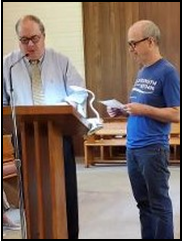Unlike other Christian denominations, there is no ordination of new ministers within the Quaker tradition. As I have watched Ray Geers’ lengthy spiritual journey that has culminated in his recording as a Quaker minister, I have reflected upon the differences between ordination and recording. Quaker ministers are not required to complete formal theological training. It is instead the role of a Yearly Meeting to determine the call to ministry of an individual.
The process of becoming a recorded minister differs from Yearly Meeting to Yearly Meeting. In our Yearly Meeting (Wilmington Yearly Meeting), the process begins when a local Meeting, such as our Meeting, recognizes that an individual has certain ministerial gifts. A Clearness Committee is then appointed by the Meeting to guide the individual into determining their call to ministry.

Following a time of discernment, which may take a few meetings of the Clearness Committee, they can bring the individual’s name to Ministry and Counsel for further clarity. If so led, Ministry and Counsel can bring the seeker’s name to Meeting for Worship with Attention to Business to be approved at the Meeting level for recording. Upon such approval, the individual’s name is sent to Yearly Meeting for consideration. Upon acceptance by Yearly Meeting, the individual comes under the care of the Training and Recording Committee. Prior to this last Yearly Meeting session in July, individuals would first go to Quarterly Meeting before being sent forward to Yearly Meeting. A change in policies and procedures approved at this year’s Yearly Meeting that affects Quarterly Meetings roles means that this step of being approved at the Quarterly Meeting level is no longer required.
The stringent requirements of the Training and Recording Committee assure that the individual is deeply immersed in the process of determining their call to ministry. Individuals in the recording process must complete certain classes. Hebrew and Christian scripture is a requirement, as is pastoral care. There is a focus on communication skills, as well as on Quakerism.
A closing session, My Personal Credo, requires that a candidate for recording must write a paper and share it with other candidates, focusing on ‘what I believe and why I believe it.’
Each candidate is assigned a spiritual mentor to regularly meet with them during the process and to help and encourage them along the way.
At the conclusion of this lengthy process of taking classes, writing papers, and spiritual mentoring, the candidate’s name is then sent to Yearly Meeting’s Ministry and Counsel for review. Upon their approval, the candidate is then moved forward to be considered for recording at a full session of Yearly Meeting.
With all his responsibilities to his family, his work and as a guiding spirit at CFM, Ray successfully completed each step required of him that led him to the podium on August 1 to share his very first spoken message as a recorded Quaker minister.

This is a fascinating process- thanks for your detailed description. So unlike (as with many other things) the conventional protestant ordination process. “Discernment” seems to lie close to the heart of all Quaker process.
Congratulations to Ray on his recording, and gratitude to you and others for your guidance along his way.